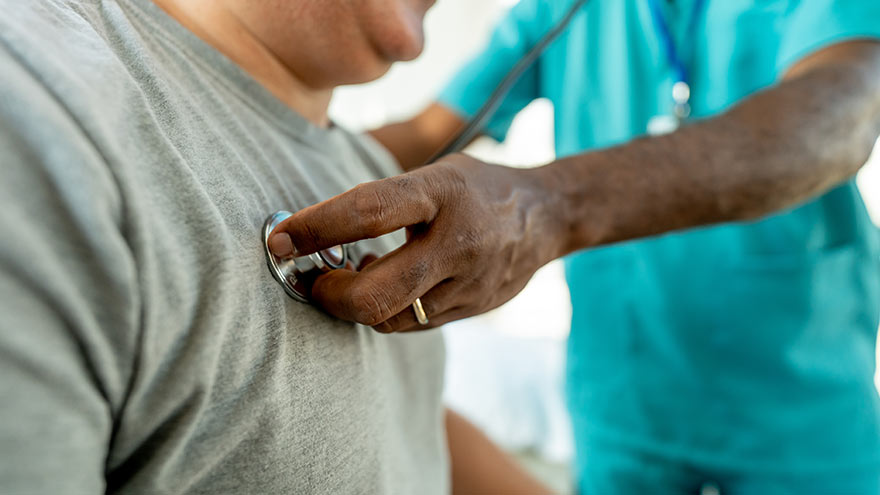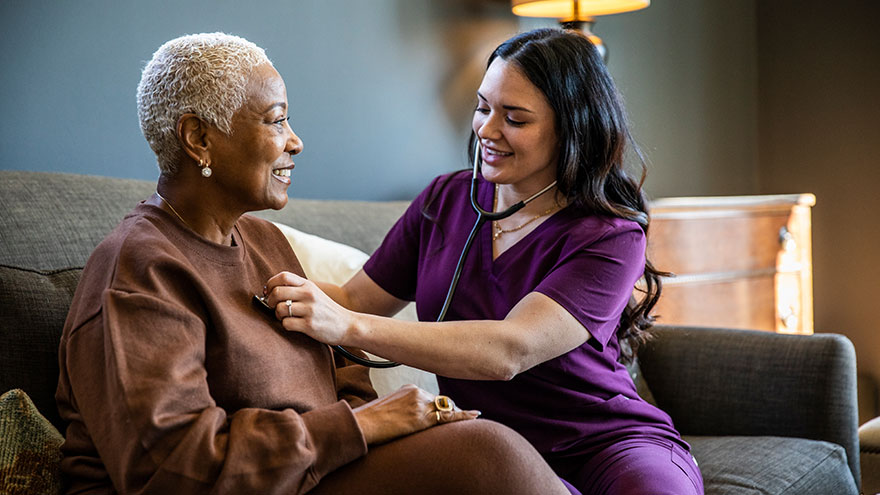Buscar
-
Celebrating Resilience: Raquel's Remarkable Journey Through Breast Cancer Treatment
Raquel was 33 when she was diagnosed with breast cancer. It was April 2023, when she found a lump in her breast and was referred to the William N. Pennington Cancer Institute. After comprehensive imaging, she was diagnosed with invasive lobular carcinoma, which is a type of breast cancer that begins in the milk-producing glands of the breast. Between June 2023 and January 2024, she received a total mastectomy, chemotherapy and radiation at Renown Health. “Breast cancer is uncommon in women under 40, but any woman with a mass or lump in her breast should have an exam by a physician and imaging at any age,” said Dr. Lee Schwartzberg. In fact, according to the Centers for Disease Control and Prevention (CDC), only 9% of all new cases of breast cancer in the U.S. are found in women younger than 45. “It was a pretty scary diagnosis, but I’ve been led by great people through the process,” she said. “They were so helpful and there for me throughout the chemo and radiation.” Raquel's journey through breast cancer treatment at the William N. Pennington Cancer Institute was marked by the exceptional care provided by the Renown Health team, including nurses, nurse navigators, therapists, support teams and providers. Among the dedicated professionals, Dr. Michelle Chu and Dr. Lee Schwartzberg played pivotal roles in Raquel's diagnosis and subsequent treatment plan. Their expertise, compassion and commitment to patient care left an indelible impact on Raquel's experience. Their thorough examination and comprehensive approach ensured that Racquel received the best possible care for her invasive lobular carcinoma. In addition to the care provided at Renown, Raquel greatly benefitted from being connected with a mentor by Dr. Chu. This mentor, Kayla, had undergone a similar diagnosis and treatment plan, and at the same age Raquel. They texted and called each other throughout Raquel’s treatment, providing additional support through a challenging time. As of January 2024, Raquel is done with her treatment and continues to see her care team for follow-up appointments. “I’m through the worst and ready to rebuild my life,” Raquel said. To help celebrate this milestone, Nevada Athletics invited Raquel to receive the game ball at a Nevada Men’s Basketball game. She was joined on the basketball court for this special recognition by her husband, Raul; mother, Arlene; and two daughters, Ryleigh and Rhiannon. Racquel's journey is not only a testament to her resilience but also a tribute to the invaluable contributions of Dr. Chu and Dr. Schwartzberg in guiding her towards triumph over breast cancer.
Read More About Celebrating Resilience: Raquel's Remarkable Journey Through Breast Cancer Treatment
-
How Regular Cervical Cancer Screenings Can Save Lives
According to the American Cancer Society, approximately 13,820 new cases of invasive cervical cancer will be diagnosed, and 4,360 women will die from cervical cancer. However, cervical cancer is preventable with regular screening tests and the HPV vaccine. It’s important to note that medical advances have allowed progress in diagnosing and treating cervical cancer. While it used to be one of the most common causes of cancer death for American women, the incidence of death has significantly declined. What to Know About the HPV Vaccine HPV vaccination is the best way to prevent cervical cancer and is recommended for all youth starting as early as age 9, or for teens and adults up to age 45 who didn’t start or finish the series. In Nevada, only 50.1% of teens ages 13-17 have been vaccinated for HPV. There are 13 types of HPV, and the vaccine Gardasil 9 protects against 9 of those HPV strains, greatly reducing the incidence of cervical cancer among vaccinated individuals. What to Know About Cervical Cancer Screenings The CDC says the most important thing you can do to help prevent cervical cancer is to have regular screening tests starting at age 21. And there are two common tests that can detect early stages of cervical cancer (or precancer) and improve health outcomes. The pap test (or pap smear). This screening looks for precancers. Women should begin getting pap smears when they’re 21. The human papillomavirus (HPV) test looks for the virus that can cause these cell changes. Cervical Cancer Screening Schedule The American Cancer Society offers the following guidelines for screenings: All women should begin cervical cancer screening at 21. Women between 21 and 29 should have a pap test every three years. Beginning at 30, the preferred way to screen is with a pap test combined with an HPV test every five years. This is called co-testing and should continue until age 65. A pap test (or pap smear) is performed during a regular screening appointment to look for precancers, cell changes on the cervix that might become cervical cancer if they are not evaluated or appropriately treated. Typically outpatient procedures can reduce the risk of long-term health impacts that prevent pre-cancerous cells from becoming cancer cells. Women over 65 who have had regular screenings in the previous ten years should stop cervical cancer screening as long as they haven’t had any severe precancers found in the last 20 years. How to Get Screened Request an appointment with your primary care physician or OBGYN to schedule a screening.
Read More About How Regular Cervical Cancer Screenings Can Save Lives
-
6 Signs of Heart Failure
Heart failure is a serious medical condition that occurs when the heart is unable to pump blood effectively, leading to a variety of symptoms and potential complications. Although there has been progress made in the treatment of many forms of heart disease, heart failure continues to be a prevalent and life-threatening condition – nearly 6.2. million adults in the U.S. have heart failure. Recognizing the signs of heart failure is crucial for early detection and timely intervention. We talked to Ruth Skinner, APRN at the Renown Institute for Heart & Vascular Health, about recognizing common signs and symptoms of heart failure. Heart Failure Signs and Symptoms The symptoms of heart failure may be subtle and can be mistaken for normal signs of aging. Common symptoms of heart failure are due to extra fluid or congestion – typically starting with congestion of the lungs, then moving to different parts of the body. Common heart failure symptoms include: Breathing Difficulties (Dyspnea): One of the hallmark symptoms of heart failure is shortness of breath during daily activities and having trouble breathing when lying down. Fatigue and Weakness: Because heart failure can lead to reduced blood flow to the body’s tissue, patients may find themselves becoming tired and weak even during routine activities. Swelling (Edema): Fluid retention in the body can cause noticeable swelling. Weight gain along with swelling of the feet, legs, ankles or stomach is often a key sign of worsening heart failure. Rapid or Irregular Heartbeat: Heart failure can disrupt the heart's electrical signals, causing irregular heartbeats (arrhythmias) or a rapid heartbeat (tachycardia). These can be felt as palpitations or fluttering sensations in the chest. Persistent Cough or Wheezing: Fluid buildup in the lungs triggers a persistent cough, sometimes accompanied by pink or white mucus. Loss of Appetite or Nausea: Heart failure can affect blood flow to the digestive system, leading to symptoms like loss of appetite and nausea. If you or a loved one experiences any of the above signs and symptoms, it’s important to seek medical attention promptly.
-
What Is an Echo-Tech?
When it comes to our heart, keeping this vital source of life in tip-top shape is of utmost importance. Echo technologists or echocardiographers, otherwise known as "echo-techs," are charged with that mission, providing critical information that leads to life-saving interventions to keep our hearts beating strong. Adrianne Little, echocardiographer at Renown Health, breaks down the echo-tech's role in the health system, the educational path it takes to get there and the unique perks that come with the profession. What does an echo tech do? “Echo techs play a key role in the diagnosis and treatment of patients,” said Adrianne. “We are members of the cardiovascular imaging team that perform ‘heart ultrasounds’ or echocardiograms. Although we are most commonly known as echo techs, our official title is either ‘cardiac sonographer’ or ‘echocardiographer.’” Echo techs use imaging technology and sophisticated ultrasound equipment to produce images of the heart. These images show how well the heart functions, as well as the valves, chambers and blood flow. Echocardiograms are used to diagnosis and treat a variety of heart conditions such as murmurs, arrhythmias and heart failure. At the end of the day, the main goal of echo techs is to help our cardiovascular team provide the quickest and most accurate diagnoses to help with patient management and help them receive the highest standard of care. “When it comes to looking at the heart, we are part of the front-line team," said Adrianne. “We provide real time critical information that leads to life saving interventions down the road.”
-
Staying Heart-Healthy with Genetic Screening
February is American Heart Month. While cardiac care is crucial every time of year – especially as heart disease stays the number one killer in the United States – American Heart Month serves as a great reminder to stay on top of your heart health. We spoke with Malina Ruiz, a cardiology nurse practitioner at Renown Health, on three key ways to embrace heart-healthy living and how genetic screening can help inform you of certain genetic risks that can play a role on the cardiac life stage. 1. Invest in a heart-healthy diet. Eating a diet that is rich in fruits, vegetables, whole grains and healthy fats (including monounsaturated fats such as avocados and polyunsaturated fats such as sunflower oil) is a key defense in protecting your cardiac health, according to Malina. While you are filling your plate with these nutritious foods, remember to keep an eye on your saturated and trans-fat intake, and try limiting foods that are high in those fats. “No matter what age we are, maintaining a heart-healthy diet will always be important,” said Malina. Need help finding cardiac-friendly meals? The National Heart, Lung and Blood Institute makes it easy with heart-healthy recipes and tips from experts. 2. Do an exercise audit. “Keeping an active lifestyle during our younger years is one of the most important factors that affect heart health in future years,” said Malina. Maintaining a regular exercise regimen that allows you to raise your heart rate and break a sweat can help prevent future cardiac events. A good rule of thumb is to aim for 150 minutes a week of moderate-intensity exercise, which averages out to 30 minutes a day on 5 days out of the week. It’s never too late to start a regular exercise routine! Exercise doesn’t have to be something you dread – leverage American Heart Month to find activities that you enjoy. The American Heart Association can help you discover new ways to move your body. At the end of the day, as Malina emphasizes, “any movement is better than nothing!” 3. Don't skip those check-ups. Regular preventative visits with your primary care provider can help you identify possible risk factors for heart conditions before they start actively affecting your life. “Check-ups become even more important as we age, along with being aware of the signs and symptoms of heart disease, heart attack and stroke,” added Malina. There’s no time better than the present – call our expert scheduling team today at 775-982-5000 to request a preventative check-up with your primary care provider.
Read More About Staying Heart-Healthy with Genetic Screening
-
8 Reasons to See a Cardiologist
While February is recognized as American Heart Month, it’s important to prioritize your heart health 365 days a year. Cardiologists play an integral role in our overall health and wellbeing – they are the experts when it comes to preventing and treating heart and vascular diseases. Dr. Jad Al Danaf of Renown Institute for Heart & Vascular Health shares eight reasons to visit a cardiologist. 1. Abnormal EKG The American Heart Association states an electrocardiogram, abbreviated as EKG or ECG, is a recording of the heart’s electrical activity to measure the rate and rhythm of the contractions in the upper and lower chambers of the heart. An EKG detects heart problems or abnormalities. If you have an EKG that shows abnormal results, you’ll want to see a cardiologist. An abnormal EKG can mean many things, such as irregular heart rate, heart rhythm abnormalities in the shape or size of the heart, medication side effects, and more. A cardiologist is most qualified to evaluate an abnormal EKG and determine the cause. 2. Immediate family history of heart disease or sudden cardiac death Knowing your family health history is essential to identify if you’re at risk for certain health conditions such as heart disease. For example, if you’re aware of anyone in your immediate family who had or has had heart problems or passed away from sudden cardiac death. In that case, you’ll want to discuss it with a cardiologist so they can determine if screenings, medications, or lifestyle changes are needed to help lower your risk. 3. Chest pain or shortness of breath with exertion If you have chest pain or shortness of breath that starts or worsens with activity, it may indicate a heart problem, and you should schedule a visit with a cardiologist immediately. Severe chest pain might be a sign of a heart attack or other serious medical emergency. If you’re experiencing severe chest pain, shortness of breath, or any other signs of a heart attack, call 911 immediately. 4. High blood pressure Have you had a high blood pressure reading? If so, it’s recommended to consult with a cardiologist for further evaluation. High blood pressure puts you at risk for heart disease and stroke, as uncontrolled high blood pressure can damage arteries, reducing blood flow and oxygen to your heart and brain.
-
5 Things to Know About Women’s Heart Disease
Heart disease is more common in women than many people think. In fact, it is the leading cause of death in the United States, ahead of cancer and stroke. However, the common signs and symptoms we often associate with men and heart disease don’t always align with women. Thankfully, Renown Health is home to the first women’s heart center in Nevada. The Helaine Greenberg Women’s Heart Center gives women in our community the opportunity to receive exemplary care and education. “At the Women’s Heart Center, we are proud to offer the women of our community the treatments, therapies and education they need to fight this silent killer,” Dr. Danish Atwal. 1. The warning signs for heart disease present differently in women than they do in men. Both men and women may experience chest pain during a heart attack, but the similarity of symptoms ends there. Heart disease is especially problematic for women because more than half of women who die of heart disease have no symptoms at all. Women tend to have subtler symptoms that mimic symptoms associated with common, mild illnesses: Fatigue or weakness Pain, pressure or tightness in the center of the chest Pain that spreads to the upper body, neck or jaw Sweating, nausea or vomiting Sudden dizziness Shortness of breath Trouble sleeping 2. Women are often not treated with the same medications as men, even when they should be. Women are less likely to receive heart medication because their disease is often misdiagnosed or because they do not seek proper care. According to a study done by Harvard Health Publishing in 2020, “A general lack of awareness of women’s heart disease may lead to doctors or patients missing heart attacks in women or delaying their diagnosis. For example, while the frequency of cardiovascular disease tends to be lower in women before menopause than in men, the frequency dramatically increases after menopause, when it accounts for approximately one out of every three deaths in women. 3. Women who have hypertension, high cholesterol, type 2 diabetes or gestational diabetes during pregnancy are at a higher risk of a heart attack in the future. Women who experienced complications related to developing high blood pressure or hypertension during pregnancy had a 63% increased risk for developing cardiovascular disease later in life, as stated by research funded by the National Heart, Lung, and Blood Institute. According to that same study, researchers found that early screenings and monitoring in four target areas – blood pressure, cholesterol levels, glucose levels and body mass index – could provide even more personalized targets to help delay or possibly prevent future cardiovascular events among women.
Read More About 5 Things to Know About Women’s Heart Disease
-
Attending Burning Man? Health Tips From Renown
Renown Health welcomes you back from Burning Man. To make sure you have the support you need, here are some tips on where to get healthcare after your return from the playa. Our urgent cares see patients 365 days a year for medical concerns that are urgent but not life-threatening. This can include fractures, cuts, burns, sprains, fevers, animal bites, rashes, sore throats and fevers. Where To Get COVID-19 & Monkeypox Tests in Reno-Sparks Renown Health’s emergency rooms do not provide walk-in COVID-19 or monkeypox testing for patients. If you are experiencing symptoms related to COVID-19 or monkeypox, we recommend you make an appointment with your primary care provider or visit one of our urgent care locations. Testing for COVID-19 is also available at local pharmacies in the Reno-Sparks area. Please visit Washoe County's COVID-19 page to learn more. Labor Day Holiday Hours: Fernley and Fallon urgent care locations will be open from 9 a.m. to 3 p.m. on Monday, Sept. 5; all other Renown urgent care locations are open from 9 a.m. to 5 p.m.
Read More About Attending Burning Man? Health Tips From Renown
-
Avoid Heat Exhaustion With This Simple Checklist
Young children under 4 and adults over 65 are especially vulnerable to heat exhaustion. Avoid heat exhaustion this summer with some expert tips. Northern Nevada summers can be downright hot, and although the balmy temperatures can feel great, they may cause heat-related illness, also known as heat exhaustion. Infants and children under 4 and adults over 65 are particularly vulnerable to heat exhaustion because their bodies adjust to heat more slowly. Without proper intervention, heat exhaustion can progress to heat stroke, which can damage the brain and other vital organs and even cause death. The Warning Signs of Heat Exhaustion Heavy sweating Elevation of body temperature Paleness Muscle cramps Tiredness, weakness, dizziness Headache Fainting Nausea or vomiting Cool and moist skin Fast and weak pulse Fast and shallow breathing Heat stroke happens when the body’s temperature rises rapidly and the body loses its ability to sweat. The Symptoms of Heat Stroke Body temperatures rising to 106 degrees or higher within 10 to 15 minutes Red, hot and dry skin (no sweating) Rapid, strong pulse Throbbing headache Dizziness or nausea Prevention and Treatment Make sure your air conditioner works Stay indoors and drink plenty of fluids Limit strenuous outdoor activities to mornings and evenings Drink plenty of water throughout the day Avoid caffeine and alcohol Do outdoor activities in the shade and wear light, loose clothing Take plenty of breaks and drape a wet bandanna around your shoulders to cool down If you suspect you or someone else is headed toward heat exhaustion or heat stroke, call 911 immediately.
Read More About Avoid Heat Exhaustion With This Simple Checklist
-
Riesgos de insuficiencia cardíaca y esperar lo inesperado
For the average person, detecting the signs of heart failure can be tricky, especially since people can look fairly healthy and have few symptoms. We asked Christopher Rowan, M.D., of the Renown Institute for Heart & Vascular Health, to answer our most pressing questions about heart failure. Even with more technology in medicine and a greater awareness about health today, the Centers for Disease Control and Prevention still reports that one in every four U.S. deaths is caused by heart disease. The real tragedy of heart-related deaths is that they are both common and preventable. “Heart failure can have many forms that are seen in anyone at any age," says Christopher Rowan, MD, with Renown Institute for Heart & Vascular Health. "As many forms as it has, it can also have as many causes. Although the symptoms of heart failure are numerous, people can look mostly healthy and have relatively few symptoms.” We sat down with Dr. Rowan to ask some common questions about heart failure. How can I tell if I have heart failure? What are some sure signs? "The signs and symptoms of heart failure are numerous, but the most common ones are shortness of breath when trying to walk (which differs from somebody’s normal pattern); progressive swelling in the feet, legs and ankles that does not disappear overnight; and waking up at night due to shortness of breath or waking up more than normal to urinate," Dr. Rowan says. Can heart failure be cured? "The treatment of heart failure depends on its primary cause," Dr. Rowan says. "Various forms of heart failure can be cured; however, the person is always at risk for recurrence. Some forms of heart failure have no cure but can be managed and stabilized and people can live a relatively normal life for years." What can I do to prevent heart failure? "To prevent the onset of heart failure, know your risk factors, including high blood pressure, diabetes, smoking and an unhealthy lifestyle," Dr. Rowan says. "If you have any of these risk factors, work to get them under good control and stop smoking. If you are overweight, start a daily routine where you walk at least 45 minutes per day, 5 days per week. Walking is the best exercise for your cardiovascular health." To learn more, visit the Heart Failure Program at the Renown Institute for Heart & Vascular Health. We want to hear your story! If you or a friend have been treated for a heart condition at Renown Health and are interested in chatting with us about your experience, please email your contact information to support@renown.org so we can follow up.
Read More About Heart Failure Risks and Expecting the Unexpected
-
Three Things to Know About the Enhanced Benefits of Renown’s New Medicare Program
Renown Health recently announced that it has contracted with the Centers for Medicare and Medicaid Services (CMS) on a new program that offers enhanced Medicare benefits for Medicare beneficiaries. This new direct contracting Medicare program is designed specifically for patients with Original Medicare. Here are three things to know about Renown’s new program: The goal of the program is to help care providers work together to improve patients’ health by better coordinating patient care and reducing costs. Medicare beneficiaries who choose to sign up will have peace of mind knowing that they are in a program that ensures coordinated care along with potential cost-sharing assistance for chronic care management. Signing up for this program is easy – and it does not affect your existing Medicare benefits in any way. Simply click the button below, select either your current Renown Health or Geriatric Specialty Care provider from the drop down menu, complete the form and click “Submit Form.” It only takes a minute or two to fill out the form. You will be asked to provide the name of your primary care provider and be sure have your red, white, and blue Medicare card handy. Sign Up for Renown’s Enhanced Medicare Benefit Program Voluntary Alignment Sign Up Note: Participation in this program is voluntary. If you choose to sign up, your benefits will NOT change, and you can visit any doctor, other health care professional, or hospital. Learn more about Renown’s Direct Contracting Entity for Medicare Beneficiaries here. The statements contained in this document are solely those of the authors and do not necessarily reflect the views or policies of CMS. The authors assume responsibility for the accuracy and completeness of the information contained in this document.
Read More About Three Things to Know About the Enhanced Benefits of Renown’s New Medicare Program
-
La historia de Paola: incorporar la esperanza y la determinación en el cuidado del paciente
You may recognize her from billboards around town or the cover of Renown's latest annual report, but what you might not know is the story behind the now-familiar face. Paola Espinoza-Patino is the oncology unit's associate nurse manager at Renown Regional, and she grounds her work in hope and determination daily. Meet Paola:
Read More About Paola’s Story: Bringing Hope and Determination to Patient Care











